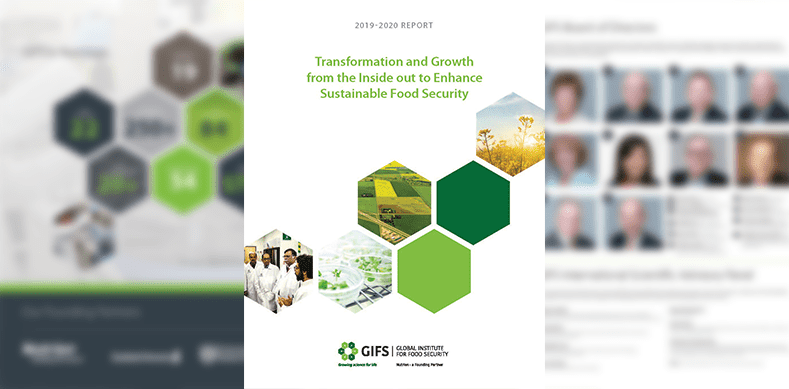
Report highlights renewed focus on efficiently bringing innovation to market
The Global Institute for Food Security (GIFS) at the University of Saskatchewan (USask) has released its 2019-20 annual report, highlighting a year of progress and innovation that saw the institute develop a new strategy that sets direction for its next phase of growth.
Founded in 2012 in a partnership between Nutrien, the Government of Saskatchewan and USask, GIFS is a public-private partnership that works with a diverse range of partners to discover, develop and deliver innovative solutions for the production of globally sustainable food.
“The past year has been nothing short of eventful – within GIFS, for our sector and of course, on a global scale,” said GIFS Chief Executive Officer Steven Webb. “At GIFS, it was a period of immense transformation and growth from the inside out, as we took the time needed to build our strategy for our future. Building on the solid foundation laid in our first few years, we developed a new and inclusive strategy on a bold vision of a world where everyone has access to safe and nutritious food.”
The strategy, highlighted in the annual report, supports GIFS’ intent to be a connector bringing diverse partners together to advance sustainable global access to safe and nutritious food. It also enables GIFS’ role as a catalyst, complementing efforts to enhance production agriculture and food processing systems.
“We have a thriving ecosystem, made up of excellent research institutes and industry, and supported by business and sector-friendly government and regulations,” said GIFS Board Chair Alanna Koch. “GIFS is well-positioned to take advantage of this ecosystem, working together with diverse partners to enhance food production and processing systems, while leveraging Saskatchewan’s and Canada’s strengths”.
The successful soft-launch of the state-of-the-art Omics and Precision Agriculture Laboratory (OPAL) was one of the highlights of the year at GIFS. The laboratory is a one-stop-shop for plant analyses from the molecular level to the plant, plot and field level, combining the digital data analyses of plant genes and traits with the latest precision agriculture technology – to improve crop yield, profitability and sustainability in the agri-food sector. Led by GIFS and with an investment from Western Economic Diversification Canada, OPAL is a collaboration between USask, the National Research Council of Canada, and Agriculture and Agri-Food Canada.
The last year also saw a number of exciting developments from the GIFS-managed Plant Phenotyping and Imaging Research Centre (P2IRC) at USask. The Centre, funded by a $37 million award from the Canada First Research Excellence Fund (CFREF) to USask, successfully completed its mid-term review during the year while producing new digital tools to accelerate plant breeding by enabling the rapid analysis of agricultural field imagery that converts data into actionable information for researchers.
A renewed focus on increased provincial, national and global impact through international collaboration saw GIFS enter into a new partnership with the Government of Bangladesh and other multi-disciplinary, multi-institutional stakeholders. In keeping with GIFS’ aim to be a connector, the report also highlights community initiatives over the last year. These include loaning equipment and supplies to the Saskatchewan Health Authority during the COVID-19 crisis for diagnostic testing of the coronavirus, and building connections with various community organizations in Saskatoon.
In a development that is essential to enhancing the quality and yield of the major oil crop, researchers at GIFS also worked with an international consortium of key academic and global seed company leaders from Canada, the United States, Europe and Israel to successfully sequenced the genome for canola. The project reached a key milestone in completing the full assembly and mapping the genomes of 10 diverse canola varieties.
GIFS is a partner on the National Agriculture Index on Agri-food Performance and the National Engineering Biology Steering Committee, and its researchers are collaborating with more than 250 research institutions and agricultural industry experts in almost 30 countries around the world, including Agriculture Victoria Research in Australia. The institute also partners with various colleges within USask, including Agriculture and Bioresources, Arts and Science, Biology, Computer Science, the Johnson Shoyama Graduate School of Public Policy and more. Other partners located on campus include Agriculture and Agri-Food Canada, the Canadian Light Source, the National Research Council, and the Sylvia Fedoruk Canadian Centre for Nuclear Innovation.
